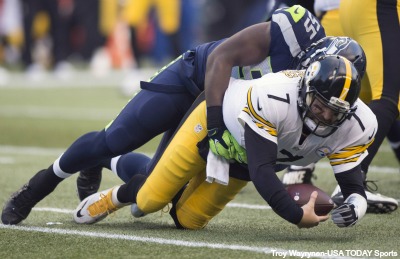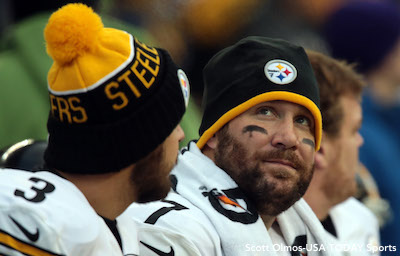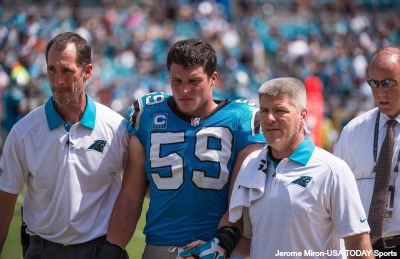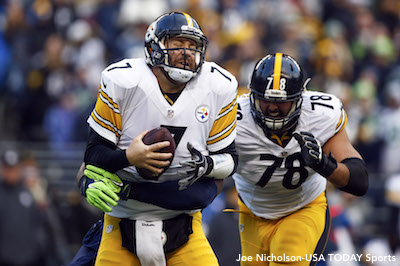Whether or not Ben Roethlisberger suffered a concussion Sunday remains unclear. After pulling himself from the game, he then concluded he had suffered a migraine.
Testing on Tuesday, however, showed that he likely did suffer a concussion, or at least was displaying symptoms of such an injury. All of that is secondary to a much more encouraging revelation, which is that Roethlisberger clearly understands the dangers of brain injuries.
According to his account, he removed himself from the Steelers' game against the Seattle Seahawks after blurred vision that he interpreted -- wisely -- as a symptom of a concussion. Roethlisberger played nine snaps of a drive after the hit that likely caused the concussion, then went to the locker room to trigger the NFL's head injury protocol.
There are problems with this, of course: Roethlisberger shouldn't have taken a single snap after the head injury in question, and someone else should have stepped in to remove him from the game rather than relying on his own decision to come out. Remember, the brain-injured can't be trusted to make smart decisions in the heat of the moment.
Had he wanted, Roethlisberger likely could have finished the entire game without his coaches batting an eye. The head injury and his blurred vision could have remained a secret he told no one -- up until recent years, that was how most concussions were handled. And no one would have been surprised: Big Ben is known for his toughness and grit on the field, and his willingness to soldier on through injuries that would bring other quarterbacks down.
That's what's impressive about this story. Roethlisberger went against all of these variables -- his reputation, his desire to play and win, the oversight of league-mandated medical staff -- and chose to take himself out of the game. In doing so, he dealt a serious blow to the Steelers' chances of winning that game -- they went on to lose and fell out of their tentative spot as a playoff wild-card team. But, more importantly, he put his health first.

That's a game-changer.
Experts on the subject of brain injuries in football have said that we have enough information to connect the dots. Football begets concussions, concussions begets dementia and other mental health problems later in life. The next step to fighting the disease is awareness, and not just among those of us who like to scream from our soapboxes that the game of football is destroying its players. The awareness needs to come from the people involved: Families of young football players, medical trainers, coaches, and the players themselves.
If NFL players understand the dangers of football and still choose to put their long-term health at risk, that's one thing. The crime occurs when players suffer irreparable damage before they even realize they're doing something wrong. That's why so many NFL veterans have sued the league for withholding information. They were denied the opportunity to at least be accountable for the consequences of their decisions.
Roethlisberger is lucky. He doesn't have to play football in an era where the dangers of the game are unknown. As CTE claims more and more members of the NFL's fraternity, Big Ben is able to look down the road and see the possible fates he entertains every time he takes a hit to the head.
And based on his comments this week, he's giving that reality a lot of thought.

"People know me, I'll play through any injury," Roethlisberger told 93.7 FM. "I've played through a lot of injuries. But the brain is not an injury that you want to play with and play through. I think more people need to understand that. We play football for such a short period of time in our lives. When you're done, you want to be a father and a husband and be the best I can be. If I have these brain injuries, it's not worth it."
No NFL player of Roethlisberger's stature has made such strong statement about concussion dangers to this point. It's an enormous win for brain injury advocates: Awareness is creeping into the highest ranks of the NFL, and it's giving players pause. What they do from this point on is their choice, but Big Ben and others are starting to grasp the staggering realities that could await them later in life.
As Roethlisberger describes it, those realities hit him hard on the sideline this Sunday, and pushed him to a course of action that, in years past, he might have ignored.
"I was on the sideline thinking, 'Do I want to go back into this game?'" Roethlisberger told 93.7. "I was thinking of my family, my lifestyle when I get done with football, with all these injuries … the brain is nothing to mess with.
"I was literally on the sideline probably for the first time maybe in my life, thinking about my family and not going back into the game because I did not feel quite right. It was definitely a moment, that's why I was honest with the trainers and doctors and wanted to tell them exactly what I was going through."

For the folks at Boston University's CTE Center, where the leading research regarding concussions, sub-concussive hits and brain disease are taking place, Roethlisberger's concussion might prove to be a watershed moment. Two weeks after the St. Louis Rams failed to pull an obviously concussed Case Keenum from the game, one of the league's biggest stars is candidly discussing his moment of enlightenment on the sideline.
Is football worth his long-term health? At some point, every NFL player will have to ask themselves that question. The risks are too known, and the conversation is growing too loud.
Roethlisberger arrived at that crossroads Sunday. Enter the game, soldier on, go for the win? Or head to the locker room, put his health and family first?
Said Roethlisberger: "I feel like I made the right [decision]."




























